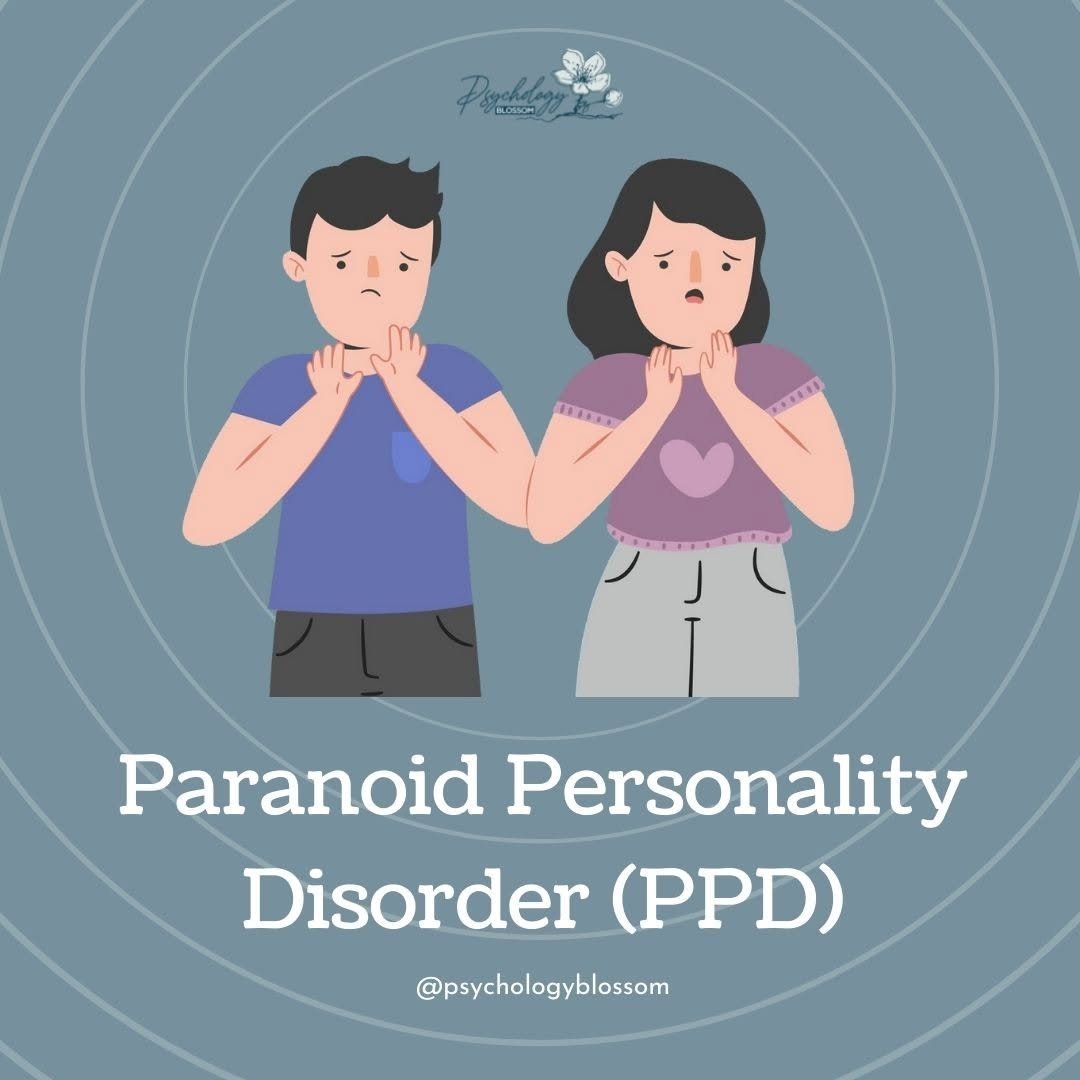Paranoid Personality Disorder (PPD): Understanding the Roots of Mistrust
Ever find yourself being overly cautious in certain situations? Paranoid thoughts can happen when we worry about what others think of us, particularly in moments of vulnerability or stress. While occasional doubts are common, persistent suspicion may indicate something deeper.
Most people, when paranoid, eventually dismiss their thoughts as exaggerated. However, when paranoid feelings occur frequently without reason and interfere with everyday life, they may point to Paranoid Personality Disorder (PPD).
The hallmark of PPD is an intense mistrust and suspicion of others without valid evidence. Individuals with PPD assume that others harbour harmful motives and are likely to deceive or exploit them. This results in constant vigilance toward physical, verbal, or social threats. Such ungrounded beliefs interfere with daily functioning, making it difficult to form or maintain close relationships.
PPD often develops in early adulthood and is more frequently diagnosed in men than women. Prevalence estimates suggest that between 2.3% and 4.4% of the general population may meet criteria for this disorder.
Symptoms
- Persistent suspicion, without sufficient evidence, that others are exploiting or deceiving them.
- Preoccupation with unjustified doubts about the loyalty or trustworthiness of friends and associates.
- Reluctance to confide in others due to an unwarranted fear that information will be misused.
- Constantly reading hidden demeaning or threatening meanings into benign remarks or events.
- Holding long-lasting grudges and being unwilling to forgive perceived insults.
- Quickness to perceive attacks on their character or reputation and readiness to react angrily.
- Suspicion without basis that a partner is unfaithful.
To meet diagnostic criteria, these patterns must be present since early adulthood, appear in a variety of contexts, and not occur exclusively during other psychotic disorders or due to medical conditions.
Causes
The exact causes of PPD remain unclear, but researchers suggest a combination of biological predispositions and psychological experiences.
✽ Biological Factors
- Family history of schizophrenia or persecutory type delusional disorder increases risk.
- Genetic vulnerability may predispose individuals to suspicious thought patterns.
✽ Psychological and Environmental Factors
- Early trauma such as physical, sexual, or emotional abuse.
- Unstable, neglectful, or overly critical parenting that reinforces beliefs that others cannot be trusted.
- Exposure to chaotic or threatening environments in childhood, which conditions hyper-vigilance.
How PPD Affects Daily Life
PPD interferes not only with personal relationships but also with work and social interactions. Common consequences include:
- Difficulty maintaining close friendships or romantic relationships due to jealousy, accusations, and mistrust.
- Workplace challenges: perceiving constructive criticism as hostile, avoiding teamwork, or suspecting colleagues of betrayal.
- Social withdrawal: avoiding gatherings out of fear of humiliation or manipulation.
- Chronic stress and anxiety stemming from being in constant “alert mode.”
These effects can perpetuate a cycle: suspicion leads to strained interactions, which confirm the individual’s fears, further strengthening their schema of mistrust.
Distinguishing PPD from Other Disorders
PPD shares some features with other conditions, which can make diagnosis complex:
- Schizophrenia: Unlike schizophrenia, PPD does not typically involve hallucinations or bizarre delusions. Suspicious thoughts in PPD are more grounded in reality, though exaggerated.
- Borderline Personality Disorder: Both can involve fears of abandonment, but PPD centers on mistrust, while Borderline focuses on unstable attachment.
- Obsessive-Compulsive Personality Disorder: Both can involve rigidity, but OCPD is driven by perfectionism, not suspicion.
Treatment
Individuals with PPD are often reluctant to seek help due to inherent mistrust of professionals. When treatment is pursued, success depends on building a safe and reliable therapeutic relationship.
✽ Cognitive Behavioural Therapy (CBT)
- CBT challenges maladaptive thought patterns, helping individuals question automatic suspicious assumptions.
- Focuses on improving communication skills, building empathy, and managing anger.
- Teaches stress management and emotional regulation to reduce constant vigilance.
✽ Medication
- Medication is not a primary treatment. However, antidepressants or anti-anxiety medication may be prescribed if secondary depression or severe anxiety is present.
Living with PPD
Life with Paranoid Personality Disorder can feel lonely and exhausting. Constant mistrust drains energy, and relationships may collapse under the weight of suspicion. Yet, recovery is possible. With therapy, individuals can learn to:
- Recognize the difference between justified caution and excessive paranoia.
- Develop healthier coping strategies and reduce reliance on defensive hostility.
- Foster trust gradually and safely in relationships.
Prognosis varies. While PPD is considered a long-term condition, treatment can significantly reduce its impact on quality of life and help individuals form more fulfilling relationships.
We recommend This Video to those who want to learn more about Paranoid Personality Disorder and effective ways to cope with mistrust.
About Us
We are a team comprising psychologists based in Singapore endeavouring our best to prioritise our clients’ needs. When you embark on this journey with us, we take a collaborative approach where you and your psychologist work closely together, and listen to what you have to say — No judgments, and in a safe space. Meet our Team
Quick Links
Contact Us
150 Cecil Street #07-02 S069543
Opening Hours
Monday to Friday: 8am to 6pm
Saturday: 8am to 2pm
Sunday: 10am to 2pm (Online only)
Admin Hours
Monday to Friday: 8am to 5.30pm
Saturday: 8am to 2pm
© Copyright 2023 – Psychology Blossom | Privacy Policy | Terms


